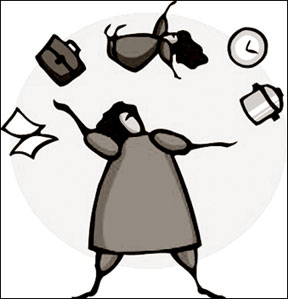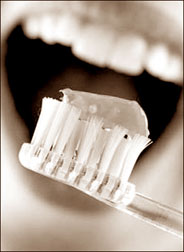|

Under stress
The timetable of a working mother makes one tired just by looking at
it. A typical day would start at 6 a.m. and end after dinner time. The
hard work can be compounded by the presence of demanding in-laws,
children’s illnesses and deadlines to be met at work.
 A woman in this situation always feels guilty that she is not doing
enough for her children and her family, suffers from a feeling of
inadequacy and is also found wanting by colleagues and bosses at work,
and husband and in-laws at home. A woman in this situation always feels guilty that she is not doing
enough for her children and her family, suffers from a feeling of
inadequacy and is also found wanting by colleagues and bosses at work,
and husband and in-laws at home.
The children feel that their mother is not at home for them.
Colleagues are usually unsympathetic. The husband often feels that he is
being neglected. Classically, housework is not considered work at all,
but just something a woman does, naturally; so it is rare that anybody
in the family appreciates what the woman is doing for the home and
understands why she is tired and irritable.
Working women are in a state of constant stress which manifests
itself in symptoms like feeling weak, tired, irritable, having a
headache, body ache, hyperacidity, pain in the abdomen and other
gastro-intestinal problems.
These complications take them to various doctors and specialists who
usually prescribe symptomatic treatment without realising that the basic
problem is excessive stress. As a result there is no lasting
improvement. Clearly, the malady lies not in the body but in the
stressed mind.
The most common symptoms are: Weakness and fatigue: Identifying
stress as the problem behind weakness and fatigue can be difficult
because any other physical disease may cause exactly the same symptoms.
The doctor would usually prescribe non-specific treatment if no obvious
cause is found, missing the actual problem.
Aches and pains: These symptoms may lead to the doctor asking the
patient to get herself tested for a whole range of possible conditions
without any clear diagnosis. Headache: Any headache that continues for
several days needs to be evaluated, but all headaches are not a sign of
serious medical problems.
Headaches resulting from tension are very common. Patients go from
one doctor to another for eye-check ups and ENT examinations and may be
finally referred to a neurologist. Gastric problems: This group
constitutes the most common illness resulting from stress.
Hyperacidity, abdominal pain and frequent bowel movements are a
possibility and patients try out several specialists without any
abnormality being detected. Neither the patient nor the doctor recognise
the problem. It is almost never focused on when the patient is telling
the doctor her medical history.
The treatment of all these ailments does not lie in mere
symptom-targeting medication. This may cause transient improvement but
does not cure the patient. When nothing specific is found, many patients
are labelled neurotic or hypochondriac, imagining themselves to be ill
when there is no illness. They then get even less care from the family
and the medical fraternity.
Medicines are not the answer to the problem. The real treatment is to
reduce the burden on the working mother. Measures need to be taken to
reduce the level of stress of working women. Here the family, especially
the spouse, obviously plays the most crucial role in this. Helping the
working woman out with domestic chores and sharing the burden of
parenting can often do away with her hyperacidity.
Giving her time to relax, going out for a walk, meeting her friends,
and forgetting the home for a while can be an enormous stress-reliever.
The medical fraternity too should recognise the working mother syndrome
and consider this aspect when treating her. If the real cause is
detected quickly, cures can result not from medicine but from changes in
lifestyle.
Body image and sexual function after cancer
by Dr. R. A. R. Perera,
Consultant Psychologist
 For many cancer survivors, anxiety over having a life threatening
disease, adjusting to the changes that have occurred in their sexual
functioning, body image and in their intimate relationships can be
difficult. For many cancer survivors, anxiety over having a life threatening
disease, adjusting to the changes that have occurred in their sexual
functioning, body image and in their intimate relationships can be
difficult.
They might have problems like negative emotions such as anger,
resentment, grief and unresolved conflicts.
Cancer patients, particularly those who are older, are often
reluctant to discuss the topic of sex and because of this, doctors may
incorrectly assume they have no concerns. Often a consultation with
their doctor is the only legitimate place where a patient is able to
bring up their sexual difficulties.
In eastern societies like in Sri Lanka there are numerous barriers
that may make, taking a sexual history in any patient (specially cancer
patients) difficult.
The psychosexual impact of cancer and its treatments is influenced
not only by the physical changes that affect body image sexual function,
but also by other factors such as whether the person is in a current
sexual relationship, and to a certain extent the person’s age. Cancers
that potentially have the greatest impact on body image and sexual
function are
* Breast and gynaecological
* Prostate and testicular
* Head and neck
* Colorectal (intestinal cancers)
Treatments for cancer including surgery, chemotherapy, radiation and
hormonal therapy, can all negatively impact on sexual functioning.
It has been estimated that approximately half the women who survive
breast cancer report sexual problems. After a mastectomy (removal of
breast) women are particularly vulnerable, with younger women being
twice as likely to experience sexual problems than older women.
Women who are given hormonal treatment for breast cancer have
decreased circulating sex-hormones (estrogens), which can cause loss of
sexual desire, vaginal dryness and painful sexual intercourse.
In male, even with a successful surgery for prostate cancer, impaired
sexual function may still be a significant problem, particularly over
time. There is also a risk of urinary incontinence, though this improves
over time for the majority of patients.
It has been estimated that about 70% of men and women experience
sexual dysfunction after surgery for intestinal cancers (colorectal
cancer).
Psychosexual dysfunction is higher in patients with a urinary or
stools bag, compared to those with intact urinary or stools sphincters
(valves).
It should be recognised that many drugs and medications for cancer
therapy would influence sexual performance.
Simple measures such as use of vaginal lubricants, local estrogen
creams or products to facilitate erectile function may be all that is
required for most of the patients. More complex situations will require
psychological assessment and psychotherapy.
The patient may express a range of beliefs, attitudes and feelings
about sex, and about having cancer.
It is important that the patient feels they are supported in a
holistic approach, which focuses on their quality of life, their
intimate relationships, and their social situations.
Smoking links to hearing loss
Smoking and obesity could both cause permanent hearing damage, say
scientists. Either could threaten blood flow to the ear, they say, with
damage levels clearly linked to the level of obesity or the length of a
smoking habit. However, the Antwerp University-led study found that high
levels of work noise remained the biggest risk. In a separate study,
smoking in middle age was linked to worse memory, which could hasten the
arrival of dementia.
A link between smoking and hearing problems has been suggested by
others, but the conclusions of the latest research, involving more than
4,000 men and women aged between 53 and 67, offer the most convincing
evidence to date.
All the study participants were given a hearing test, then asked
about their lifestyle and where they worked. Dr. Erik Fransen, of the
University of Antwerp in Belgium, one of the lead researchers, said that
the ability to pick out high frequency sounds was damaged in smokers and
the obese, although to not as great an extent as those exposed to very
loud noise in the workplace.
He said: “The hearing loss is proportional to how much you smoke and
your body mass index (BMI). “It starts getting worse once you have
smoked regularly for more than one year.” He said that, unlike some
parts of the body, once damage had occurred, there was no prospect of
recovery.
“Once the damage is done, it’s done. It does not repair.” Blood flow
The theory behind the hearing damage is similar to the reason smoking
and obesity can harm other organs.
Both can disrupt the flow of blood around the body, and Dr. Fransen
suggested that the resulting lack of oxygen, coupled with the failure to
remove toxic waste from the ear, can be damaging. Amanda Sandford, from
the pressure group Action on Smoking and Health (ASH), said There are so
many young people who think that they can give up in middle age and
escape some of the other diseases associated with smoking. “In this
case, some of the damage may already have been done.”
The study was part-funded by the Royal National Institute for the
Deaf (RNID), and Dr. Mark Downs, from the charity, said that, with an
ageing population, age-related hearing loss could be a major problem.
“Losing your hearing in later life can make it harder to maintain
contact with friends and families and lead to isolation and depression,
so making small concessions now could have an enormous effect in the
long term.”
A separate research project involved more than 5,000 civil servants,
who completed memory and reasoning tests and then repeated them five
years later. It found that smoking in middle age was linked to a decline
in memory and verbal reasoning ability. Memory problems at this age have
been linked to a swifter onset of the symptoms of dementia. - BBC NEWS
Oral health:
Tips for proper dental care
 Don’t take your smile for granted. Maintain good oral health by
practising regular dental care habits and reporting problems to your
dentist promptly. Clean your teeth daily and see your dentist one to two
times a year to prevent gum disease and other oral health problems. Don’t take your smile for granted. Maintain good oral health by
practising regular dental care habits and reporting problems to your
dentist promptly. Clean your teeth daily and see your dentist one to two
times a year to prevent gum disease and other oral health problems.
Tips on how to brush your teeth:
* Brush your teeth at least twice a day and ideally after every meal,
using fluoride-containing toothpaste.
* Use a soft-bristled toothbrush ? it’s gentler on your gums.
* To brush properly, hold your toothbrush at a slight angle against
your teeth and use short back-and-forth motions.
* Brush the inside and chewing surfaces of your teeth.
* Brush your teeth for about two minutes each time you brush.
* Brush your tongue.
* Avoid vigorous or harsh scrubbing, which can irritate your gums.
* Replace your toothbrush every three or four months, or sooner if it
becomes frayed.
* Consider using an electric toothbrush, especially if you have
arthritis or other problems that make it difficult to brush well.
Flossing for oral health a toothbrush can’t reach all the tight spaces
between your teeth or the areas under your gumline. That can allow
plaque to build up, threatening your oral health. Flossing, though,
removes those particles and improves oral health.
Tips on how to floss your teeth:
* When you floss, gently ease the floss between your teeth.
* Pull the ends of the floss against the front and back surface of a
tooth so that the floss forms a “C” as it wraps around the tooth.
* Gently pull the floss from the gumline to the top of the tooth to
scrape off plaque.
* Floss the backs of your teeth.
* Use fresh floss as you progress through your teeth.
* If you have trouble getting floss through your teeth, try waxed
floss. *If it’s hard to manipulate the floss, try using a floss holder.
Other oral health care tips Brushing and flossing are the mainstays of
good dental care and oral health. In addition to those, you may also
want to consider these oral health tips:
* Use an interdental cleaner, such as a dental pick or dental stick
specially designed to clean between your teeth.
* Use a mouth rinse to help reduce plaque between your teeth.
* Use oral irrigators, or devices that aim a stream of water at your
teeth, to remove food particles.
* Don’t use toothpicks or other objects that aren’t made to clean
your teeth. Oral health problems to report to your dentist Call your
dentist promptly if you develop any of the following signs and symptoms
that may suggest oral health problems:
* Red, tender or swollen gums
* Gums that bleed when you’re regularly brushing and flossing
* Gums that are pulling away from your teeth, which may make your
teeth seem longer
* Pus around your teeth and gums when you press on the gums
* A bad taste in your mouth
* Loose teeth
* Changes in the way your top and bottom teeth touch
* Changes in the feel of your dentures
* Sensitivity to hot and cold |
